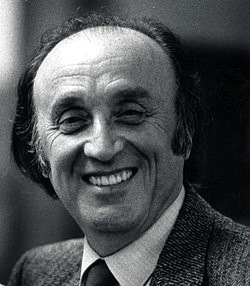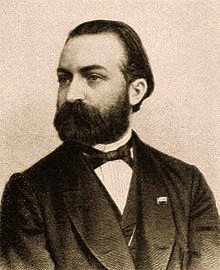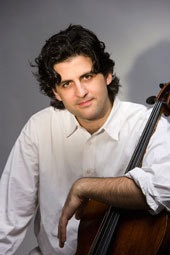The Well-Tempered Ear
Classical music review: The Wisconsin Chamber Orchestra and cellist Amit Peled triumph with Mark Kopytman’s rarely heard “Kaddish” and Haydn’s “Military” Symphony. | January 16, 2012
By Jacob Stockinger
When my mom made sandwiches for us, she would always say, “You take the bigger half.”
The same Law of Unequal Halves was at work at Friday night’s concert in the Overture Center‘s Capitol Theater by the Wisconsin Chamber Orchestra (below) with the Israeli-born cellist Amit Peled.
Overall, it was a terrific concert, one more event to cement the WCO’s reputation as a music-maker not to be missed. But yes, I’ll take the bigger half. And for me that was the second half.
It opened with an absolutely riveting performance concerto-like “Kaddish” of the late Russian-Israeli composer Mark Kopytman (below):
In this little known and rarely performed 20th century work, Peled (below) excelled. His solo cello played the part of the eldest son reciting the Jewish prayer for the dead while the orchestra played the part of the father.
The two dialogued back and forth, complete with agreement and disagreement, consonance and dissonance. Towards the end comes a stunning contrapuntal cadenza – reminiscent of Bach’s solo cello suites – in which the solo cello took on both parts, one high and the other low.
It was an emotionally wrenching journey for both performers and listeners – and already I think of it as a highlight of the current season and the new year. Not often to we get to hear new music – or music new to us – that is so compelling in a performance that is so convincing.
Then came the concert’s closer: Haydn’s Symphony No. 100, “Military.”
It is one of the last London symphonies of Papa Haydn and the WCO showed its stuff — its fine, big, precise sound.
All sections performed under the baton of WCO music director Andrew Sewell (below) with an accuracy and briskness that lived up to the martial nickname of the symphony. But special mention has to be made of the percussion, brass and wind sections that added that special seasoning and zest to the piece.
The WCO’s last recording was an outstanding 2-CD set of Mozart’s piano concertos and symphonies. I think the WCO’s Haydn is at such a high level where it should be the ensemble’s next project: Perhaps a 2-CD set of Haydn, a symphony sampler if you will, with perhaps an early or middle-period Storm-and-Stress symphony (perhaps the popular “Farewell” Symphony No. 45) , then maybe one of the Paris symphonies (the “Bear” or “Queen”; and finally one or two of the final London symphonies (the ”Miracle” or “Drumroll” or “Surprise”).
Anyway, with 104 symphonies to choose from, Haydn’s music offers riches galore that play to the strength of the WCO for many a season to come.
The concert started with another piece of relatively “new” music – the “Diversions for String Orchestra” – by Douglas Lilburn (below), who, like Sewell, hailed from New Zealand and went to Great Britain to study under Ralph Vaughan Williams. (By the way, Sewell pronounced it Ralph, not the trendy Raiph. Thank you, maestro.)
“Diversions” is not great or unforgettable music, but it is a perfect curtain-raiser. It is, by turns, perky, jaunty and lyrical; and it goes down easy. The Brits do pastoral and landscape the way the Russians do soul and suffering and the French do elegance and sensuality.
The major disappointment for me was unexpected: the Cello Concerto in B-flat by the virtuoso cellist and composer Luigi Boccherini (below). Boccherini lives on forever in the shadows of other Classical-era giants Mozart and Haydn. But his works unquestionably deserve a major rediscovery.
It is just too bad that Peled chose the most famous and most played of Boccherini’s 13 cello concertos, the one reworked by the 19th-century Romantic cello virtuoso Friedrich Gruetzmacher (below).
The playing by the both the orchestra and the soloist was first-rate, and the work has both beautiful and dramatic movements. But I found the revised orchestration too thick, too rich, too heavy, too muddy – a little like the way Mahler re-scored Beethoven’s symphonies.
Of course it is a matter of personal taste, and local critics remain divided. One critic, John W. Barker, shares my preference for the original. Here is a link to Barker’s review in Isthmus:
http://www.thedailypage.com/daily/article.php?article=35701&sid=3744f7c14aa4a059da80a3502e6cfd4b
Other critics, like Lindsay Christians of The Capital Times and 77 Square, and William R. Wineke of WISC TV’s Channel 3000, disagree. Here is a link to Christians’ review:
And here is a link to Wineke’s review for Channel 3000:
http://www.channel3000.com/entertainment/30213725/detail.html
Two critics who spoke in person to me were also divided: Greg Hettmansberger of Madison Magazine liked the revised Boccherini; Michael Muckian of Brava magazine didn’t.
Here is a link to Greg Hettmansberger’s review:
Nonetheless, I wanted the yellow waxy build-up of Romanticism to disappear so I could hear the true Boccherini and his Classical-era clarity and transparency, without misdirected and so-called help, even on modern versus period instruments. I would love Peled (below) to return to Madison and to the WCO with another Boccherini concerto, but this time with the genuine article.
My other minor disappointment is that neither Sewell not Peled seemed to milk the audience enough, despite standing ovations. Lights came up too quickly; applause was cut off prematurely. Too bad. Great performing artists also play the audience. We want to tell them how much we like them – and hear how much they like us.
True, the program was long, and there were CD’s to be sold and signed after the concert. And true, it was a cold and snowy night.
But Peled, a soloist who cuts an impressive figure – the tall, big-handed man performed in a blue Russian Cossack shirt — missed a perfect opportunity by not offering an encore.
It could have come just before intermission, right after the Boccherini.
But honestly, a short and bright movement – say a dance movement from one of Bach’s solo cello suites – would have been perfect after the Shostakovich-like darkness and heaviness of Kopytman’s “Kaddish” and great transition or set-up for Haydn’s symphony.
Why be stingy with your gifts? Plus, it is good public relations for both the soloist and the ensemble. I think audiences feel treated special when they are given more than they bargained or paid for, when the soloist or even the ensemble tips a hat to them by offering a little something extra, a bonus.
Maybe next time.
And in Peled’s case, I do hope there is a next time.
Soon.
3 Comments »








Jacob,
“Raiph” is the way VW himself pronounced it and insisted that it be pronounced it. It’s the way his friends and family pronounced it.
Thanks! – Chris
LikeLike
Comment by Chris Black — January 17, 2012 @ 11:08 am
Hi Chris,
Thanks for reading and replying with the clarification.
Then Raiph it is.
But to be honest, it is the last name that matters most.
Jake
LikeLike
Comment by welltemperedear — January 17, 2012 @ 11:58 am
Jake,
You are right! What REALLY matters is the music. 🙂
I only brought this up because I made the mistake many years ago of insisting on pronouncing it “Ralph,” only to discover to my chagrin the composer’s own strong preference.
Thanks – Chris
LikeLike
Comment by Chris Black — January 18, 2012 @ 1:34 am